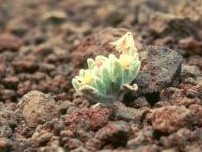Eatonella facts for kids
Quick facts for kids Eatonella |
|
|---|---|
 |
|
| Scientific classification | |
| Kingdom: | |
| (unranked): | |
| (unranked): | |
| (unranked): | |
| Order: | |
| Family: | |
| Tribe: | |
| Genus: |
Eatonella
|
| Species: |
E. nivea
|
| Binomial name | |
| Eatonella nivea (D.C.Eaton) Gray
|
|
| Synonyms | |
|
Burrielia nivea D.C.Eaton |
|
Eatonella is a special type of plant found in North America. It belongs to the daisy family. There is only one known species in this group, called Eatonella nivea. People often call it the white false tickhead.
This plant is quite small and grows for just one year. It is native to the western part of the United States. You can mostly find it in the Great Basin area, where it likes to grow in sandy soils.
Where It Grows
The white false tickhead plant has been found in several states. These include Washington (in Grant and Kittitas Counties), Oregon, Idaho, and Nevada. It also grows in eastern California, specifically in Modoc, Lassen, Mono, and Inyo Counties.
What It Looks Like
Eatonella nivea is a very short plant. It grows in a small clump, usually no more than 5 centimeters (about 2 inches) tall and not much wider. Its tiny leaves are dark green and are about 30 millimeters (1.2 inches) long. They are packed closely together and covered in a thick, grayish, wool-like fuzz.
The plant produces small flower heads one at a time. These look like tiny, pale yellow daisies, less than a centimeter across. Each flower head can have up to 13 yellow or purple ray florets (the "petals") and up to 14 yellow disc florets (the center part). After the flowers, the plant produces shiny black fruits called achenes. Each one is a few millimeters long and has a white fringe.
How It Got Its Name
The genus Eatonella was named after an American botanist. His name was Daniel Cady Eaton, and he lived from 1834 to 1885.
See also

- In Spanish: Eatonella nivea para niños

